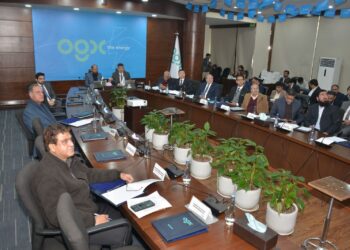Islamabad: The recurring devastation caused by monsoon rains in Pakistan has once again highlighted the structural weaknesses in governance, financial planning, and resource distribution. Cities such as Karachi, Lahore, Peshawar, and Quetta experience flooding, collapsed infrastructure, and urban paralysis every rainy season. Despite repeated promises of reform and billions allocated through federal and provincial budgets, the situation continues to deteriorate.
This crisis is increasingly linked to questions about the National Finance Commission (NFC) Award, a constitutional mechanism designed to ensure fair distribution of financial resources between the federation and the provinces. Critics argue that while the NFC Award was intended to strengthen service delivery and promote balanced development, it has, in practice, failed to address Pakistan’s long-term challenges—particularly those related to urban governance, disaster preparedness, and human development.
Understanding the NFC Award and Its Constitutional Role
The NFC Award is provided under Article 160 of the Constitution of Pakistan, which mandates a periodic formula for revenue sharing between the federal government and the provinces. The objective is twofold:
- Equitable Distribution: Ensure that all provinces receive their fair share of national resources.
- Enhanced Service Delivery: Enable provincial governments to provide healthcare, education, clean water, housing, infrastructure, and disaster management services at the local level.
Under the Seventh NFC Award of 2010, provinces saw their share of divisible pool resources rise significantly—from 47.5% to 57.5%. This was hailed at the time as a historic step toward provincial autonomy, especially after the 18th Constitutional Amendment, which devolved several critical sectors—including health, education, and social welfare—to the provinces.
However, more than a decade later, the practical results remain disappointing.
The Problem: Why Provinces Are Failing Despite Greater Resources
1. Development Budgets vs. Non-Development Expenses
One of the key criticisms is that provinces underspend on development projects—such as infrastructure upgrades, education reforms, and healthcare improvements—while overspending on non-developmental expenses, primarily salaries, perks, and pensions for government employees.
This imbalance has created a situation where long-term investments in human development and urban resilience are neglected, leaving cities vulnerable to disasters like monsoon flooding.
2. Political Prioritization Over Public Needs
Instead of investing in long-term projects such as drainage systems, water supply networks, or public transport, provincial governments often focus on short-term, politically popular schemes like flyovers, beautification campaigns, or subsidies. These may bring immediate visibility but do little to solve structural problems.
3. Weak Local Governments
Despite gaining more autonomy after the 18th Amendment, provinces have been reluctant to empower local governments. Instead, power has been centralized at the provincial capitals, depriving municipalities and districts of the ability to effectively respond to local crises.
This lack of grassroots governance has left cities like Karachi in particular at the mercy of bureaucratic delays and overlapping authorities, leading to chaos every monsoon season.
The Federal Government’s Dilemma
While provinces have gained a larger share of resources, the federal government continues to shoulder massive responsibilities:
- Debt repayment on domestic and international loans.
- Defense expenditures, which remain a large component of the national budget.
- Energy subsidies to keep electricity and fuel affordable.
- Large-scale infrastructure projects, such as motorways, dams, and power plants.
With reduced financial space, the federal government often struggles to meet its obligations, while provinces fail to mobilize their own revenues. Experts note that tax collection in provinces remains dismal, as provincial administrations rely almost entirely on transfers from Islamabad rather than creating sustainable revenue systems.
The Formula Debate: Is Resource Distribution Fair?
The current NFC formula is based primarily on population size (82% weight), with other factors such as poverty, backwardness, and revenue generation capacity receiving far less weight.
- Provinces like Punjab, being the most populous, receive the lion’s share.
- Smaller provinces—particularly Balochistan—argue that this formula is unfair, as it ignores their low population density, geographical size, and higher levels of poverty and underdevelopment.
- Even within provinces, intra-provincial inequities are glaring: rural areas remain deprived while metropolitan centers consume most resources.
This imbalance has long been a source of political tension, fueling grievances in smaller provinces that already feel marginalized in Pakistan’s power structure.
Karachi: The Most Striking Example of NFC’s Contradictions
Karachi, Pakistan’s financial capital and largest city, illustrates the paradox of the NFC Award.
- The city contributes the largest share of Pakistan’s tax revenues, including customs duties, corporate taxes, and indirect taxes.
- Yet, after every monsoon season, Karachi is left flooded, dysfunctional, and neglected, with open drains, crumbling roads, and overflowing garbage heaps.
- The city’s governance structure is fragmented among provincial authorities, municipal corporations, cantonment boards, and federal agencies, resulting in poor coordination.
This raises a pressing question: If the city that contributes the most is consistently the most neglected, is the NFC Award truly serving its purpose?
Expert Opinions: The Need for NFC Reforms
Economists and policy experts agree that reforms in the NFC Award are urgently needed. However, they caution that reforms should not mean rolling back provincial autonomy. Instead, the focus must be on efficiency, transparency, and accountability.
Proposed Reforms Include:
- Performance-Based Allocations: Provinces that show improvements in education, health, tax collection, and disaster preparedness should receive additional incentives.
- Independent Monitoring Mechanisms: Establishing an autonomous body to audit resource utilization, ensuring funds are not wasted on politically motivated projects.
- Strengthening Local Governments: Devolving more power and resources to the municipal and district levels, where service delivery directly impacts citizens.
- Balanced Distribution Formula: Giving greater weight to poverty, underdevelopment, and revenue generation capacity, rather than relying almost entirely on population.
- Clear Federal-Provincial Division: Clarifying responsibilities to prevent duplication, overlap, and wastage of resources.
Monsoon Disasters as a Wake-Up Call
Every year, the monsoon season exposes Pakistan’s weak governance and resource mismanagement. Flooding not only damages homes and roads but also leads to loss of lives, economic paralysis, outbreaks of waterborne diseases, and displacement of vulnerable communities.
The irony is that despite repeated disasters, little progress has been made in urban resilience planning. Drainage systems remain outdated, disaster management authorities lack funding, and coordination among agencies is minimal.
For critics, this is the clearest proof that the NFC Award in its current form has failed to meet its constitutional objective of strengthening service delivery at the grassroots level.
The Way Forward: Turning the NFC Award Into a Solution
The NFC Award, if properly reformed, can be a powerful tool for equitable growth. Instead of being seen as a burden on the federation, it should become a framework for shared responsibility.
- Provinces must take ownership of their responsibilities, increasing their own tax bases and ensuring that funds are used for development and disaster preparedness.
- The federal government must maintain fiscal discipline while ensuring that smaller provinces are not left behind.
- Local governments must be empowered and funded to manage essential services like sanitation, drainage, and emergency response.
Ultimately, unless accountability, transparency, and fairness are built into the system, the NFC Award risks becoming not a solution but a symbol of Pakistan’s financial dysfunction.
Conclusion
The devastation brought by monsoon rains every year is not just a natural disaster—it is a reflection of systemic governance failures and poor financial management. The NFC Award, despite its noble objectives, has not translated into improved service delivery, particularly in cities like Karachi that contribute the most but suffer the worst.
Reforming the NFC Award does not mean weakening provincial autonomy; rather, it means creating a performance-driven, transparent, and equitable system where resources are used effectively for the welfare of citizens.
Unless Pakistan embraces these reforms, the NFC Award will remain a symbol of inefficiency and inequality, while ordinary citizens continue to pay the price with their lives and livelihoods every monsoon season.

























